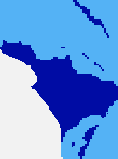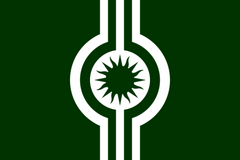Imperial Republic of Acadia
This article is incomplete because it is pending further input from participants, or it is a work-in-progress by one author. Please comment on this article's talk page to share your input, comments and questions. Note: To contribute to this article, you may need to seek help from the author(s) of this page. |
Imperial Republic of Acadia | |
|---|---|
|
Flag | |
 Acadia shown in dark blue. | |
| Capital | Prasinapotamia (Executive)
Vanjaropolis (National Assembly) Aquatiles City (Crown) |
| Largest city | Vanjaropolis |
| Official languages | Pahadelok, Vanalada, Aquatilean, Fleetian, Elvish |
| Demonym(s) | Acadian |
| Government | Constitutional semi-presidential monarchy |
• Emperor | Alexander Giannis |
• President | Binal Salvi |
• Prime Minister | Ganesh Padhi |
| Area | |
• Total | 815,123.6 km2 (314,721.0 sq mi) |
| Population | |
• 2025 estimate | 150 million |
| GDP (PPP) | 2025 estimate |
• Total | 3 trillion |
• Per capita | 20,000 |
| GDP (nominal) | 2025 estimate |
• Total | 1.125 trillion Rupees |
• Per capita | 7,500 |
| Gini | 23 low |
| HDI (2025) | 0.769 high |
| Currency | Acadian Rupee (ACR) |
| Driving side | right |
| Calling code | +55, +69 (Aquatiles City) |
| Internet TLD | .ac |
Acadia, officially the Imperial Republic of Acadia, is a country in Eastern Elisia. It has an estimated population of around 150 million and spans a land area of approximately 801,145 square kilometres, primarily continental but with a significant number of both natural and artificial islands in the Acadian Ocean. Acadia borders the Tolerian Empire to the West. It is considered a founding member of the Imperial Bloc, holding the seat formerly posessed by the Aquatilean Empire, to which the Imperial Republic is considered a successor state. Acadia is a federal constitutional monarchy, considering itself a 'crowned republic' with a President and Emperor sharing the role of head of state. Its largest city is Vanjaropolis, which is also the capital of the constituent country of Vanaladastan, and the seat of the National Assembly. Prasinapotamia and Aquatiles City are the largest cities and capitals of the other two constituent countries, Pahade and Aquatiles, respectively.
History
Prehistory
There is evidence of human habitation in Acadia going back to at least 8,000 BCE, and it is estinated that the first civilisations with permanent cities began sometime between 3000-2000 BCE, although little is known of this period due to significant destruction of records and archeological evidence.
Antiquity
Middle Ages
Early Modern Period
Late Modern Period
Great Acadian War
Warlord Era
Acadian Revolution
Present Day
Geography
Government and Politics
The Imperial Republic of Acadia has a unique government structure, being a multiparty democracy with an elected legislature, the National Assembly, who selects a Prime Minister to be the head of government, but having the title of head of state be shared between a President and an Emperor. Executive power is mostly shared between the President, the Prime Minister, and tbhe cabinet, with the duties of the Emperor being largely ceremonial.
Acadia is a federation, divided into three constituent countries, which each have their own elected governments and subnational administrations, including autonomous provinces for regional minorities. However, significant powers are reserved to the Federal government, and the overall political structure is fairly centralised.
Economy and Infrastructure
The Acadian economy operates as a hybrid socialist system or mixed economy, combining elements of central planning or command economy, industrial unionism or syndicalism, and state capitalism. Elements of a market economy are present but highly regulated, and ownership is socialised in the hands of unions, the government, and a variety of communal organisations. Syndicates, businesses which are owned by their employees and operated by industrial unions, comprise the majority of the economy and generally operate for-profit with government subsidies and oversight, while certain key sectors of the economy have been nationalised under state-owned enterprises which follow directives from the government and often operate at a loss, acting more as state-funded public services than as corporations driven by profit. Private ownership in the capitalist sense, where a business is seen as property which can be bought and sold, is prohibited, and foreign private businesses may only operate indirectly in Acadia by dealing with syndicates or state-owned enterprises.
